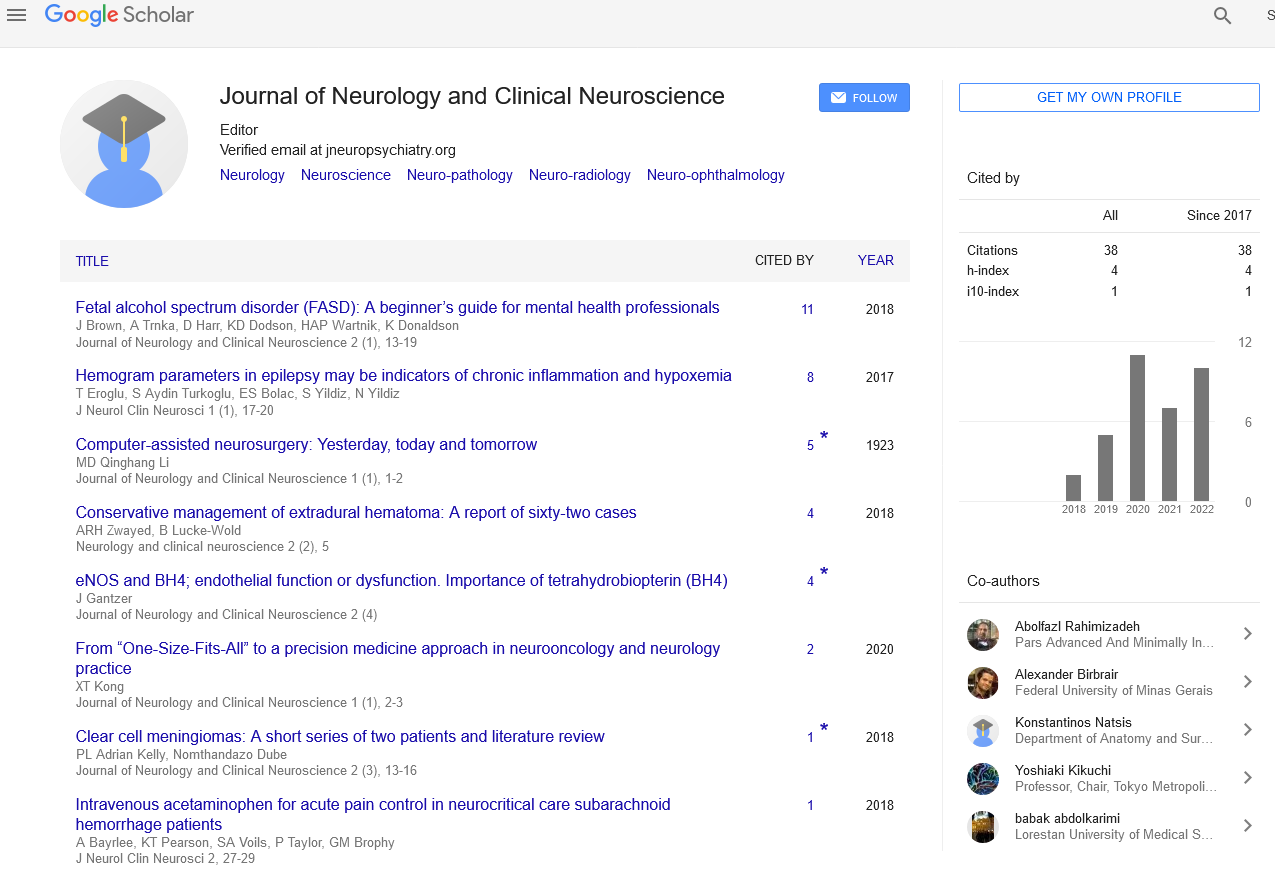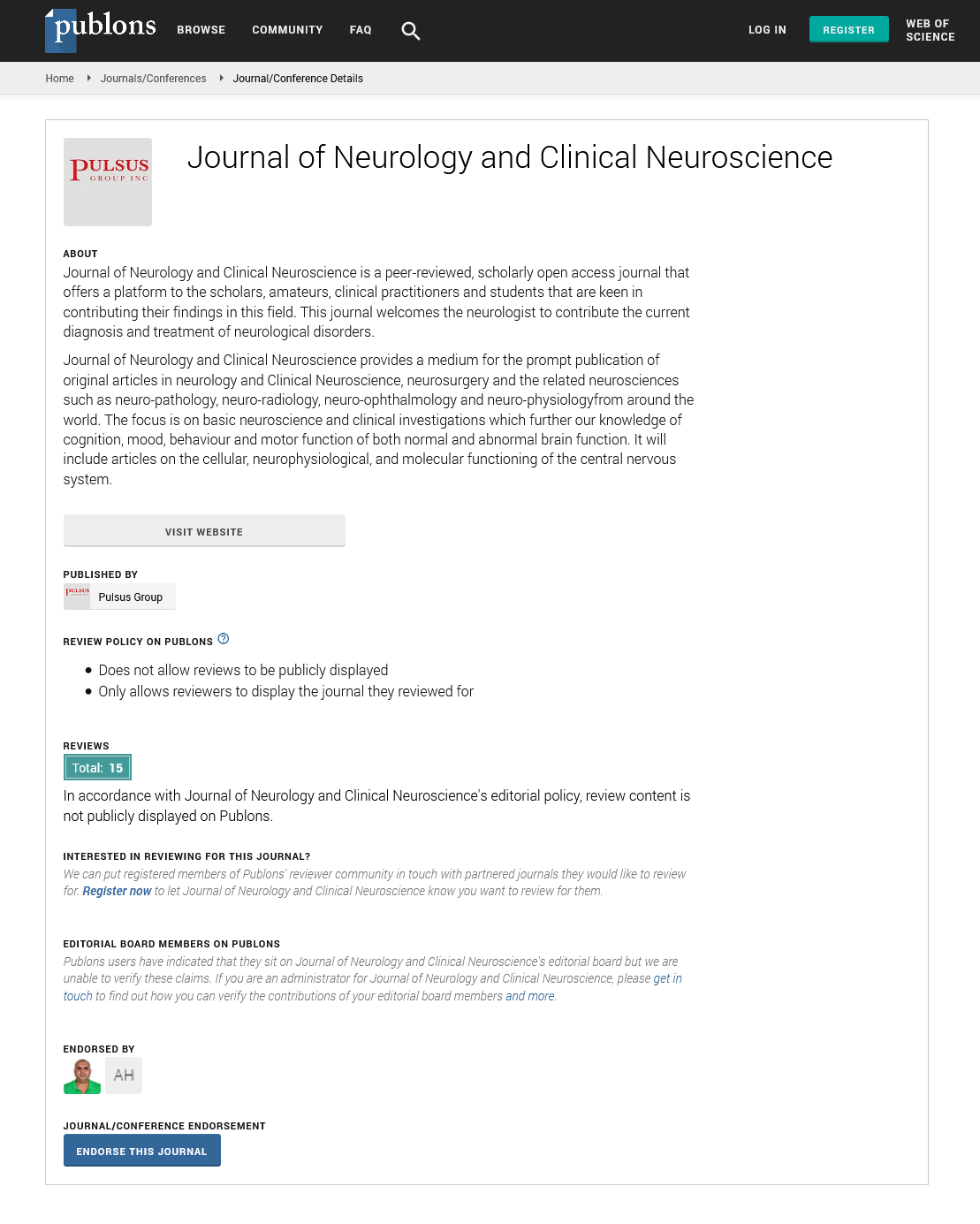How to reduce your future risk of dementia: Focusing on the experience of contact with elderly people with dementia
Received: 01-Jul-2021 Accepted Date: Jul 15, 2021; Published: 22-Jul-2021
Citation: Chen F, Y oshida H. How to reduce your future risk of dementia: Focusing on the experience of contact with elderly people with dementia. J Neurol Clin Neurosci 2021;5(3):1-2.
This open-access article is distributed under the terms of the Creative Commons Attribution Non-Commercial License (CC BY-NC) (http://creativecommons.org/licenses/by-nc/4.0/), which permits reuse, distribution and reproduction of the article, provided that the original work is properly cited and the reuse is restricted to noncommercial purposes. For commercial reuse, contact reprints@pulsus.com
Abstract
With the aging of the population, dementia has attracted increasing attention from academics in Japan. According to existing research results, the number of elderly people with dementia would reach approximately 12 million by the end of 2060 [1]. Increasing social securityrelated expenses worsens Japan’s fiscal conditions, and the fiscal sustainability of social security may be extensively influenced in the future.
Description
With the aging of the population, dementia has attracted increasing attention from academics in Japan. According to existing research results, the number of elderly people with dementia would reach approximately 12 million by the end of 2060 [1]. Increasing social securityrelated expenses worsens Japan’s fiscal conditions, and the fiscal sustainability of social security may be extensively influenced in the future.
Currently, it is challenging to cure dementia patients [2]. The most costeffective and cost- saving way to deal with dementia is to promote preventive activities for dementia [3]. A tremendous body of research has documented the risk factors of dementia and discussed the impacts of preventive actions, such as physical activity and dietary patterns [2,4]. Recently, the Lancet Commission conducted a detailed review on dementia prevention and showed that 12 kinds of modifiable risk factors might contribute to preventing or delaying the onset of dementia by up to 40% [2]. Using data from an online survey in Japan, we analyzed the linkage between lifestyle habits and dementia risk. Our study confirms that having good eating habits, regular walking, and watching TV could decrease the aggregate dementia risk indicator [4].
Although the public has understood that smoking or physical inactivity could deteriorate individuals’ health and increase the probability of having dementia, a great number of people still choose to smoke or stay in physical inactivity. Do they have lower educational attainment? Or are they too busy? The answers are no. One possible reason is that the impacts of conducting these preventive activities on cognitive ability in the short run are invisible. Due to time constraints, implementing preventive actions, such as executing sports, means that they must give up the chance to engage in other activities called opportunity cost in economics [5]. Middle-aged people usually have higher wages than other generations. They tend to utilize their limited time to obtain visible outcomes. A previous study has shown an evident decline in cognitive ability among middle-aged people (age 45-49 years) [6]. However, the invisible decline in cognitive ability usually has little or no influence on daily work and life, failing to attract enough attention. Therefore, few people attempt preventive activities to avoid cognitive ability decline or recover their cognitive abilities.
As the decline of cognitive ability is invisible, it is necessary to provide incentives for conducting preventive actions. Many previous studies have documented that caring for the elderly with dementia negatively influences their health status, such as mental health [7]. Some researchers also found that caring for the elderly with dementia would benefit caregivers by strengthening relations with the elderly or obtaining personal accomplishment [8]. When caring for people with dementia, care providers can also face correct information on dementia, which would help them understand dementia well [9]. Caregivers could observe the poor quality of life of dementia patients, contributing to the implementation of preventive actions by caregivers. Caring for dementia patients is usually accompanied by a huge care burden, disengaging them from conducting dementia preventive actions.
How about family members other than the main caregiver? Although those people do not directly participate in caring for patients with dementia, they live together with dementia patients. Therefore, they have a lower cost of understanding dementia from diverse aspects than other persons, which may trigger their interest in prevention actions. Using the same online survey data in Japan [4], we examined whether or not the experience of contact with the elderly with dementia deepens the understanding of dementia and alters their lifestyle habits [10]. Based on our empirical study, we found that the experience of contact with dementia patients was significantly correlated with a decrease in the risk score for dementia. We also confirm that respondents who understand dementia well tend to have good eating habits and food preferences. However, we did not obtain significant results in terms of regular walking.
In conclusion, although previous studies have shown that more than ten types of modifiable risk factors exist, they tell us little about altering these risk factors [2]. Strong incentives are needed to change people’s preventive behaviors. Although the experience of contact with elderly people with dementia is not an incentive, it may lead to an incentive to promote dementia prevention. At present, few studies have discussed the impact of contact with dementia on lifestyle activities. We attempt to provide convincing evidence for this viewpoint. In the future, we hope that the literature could provide more evidence that the cost of prevention can be reduced by providing appropriate information on the burden of future care to those who cannot contact with people that require dementia care.
REFERENCES
- Cabinet, Annual Report on the Aging Society. 2017.
- Livingston G, Huntley J, Sommerlad A, et al. Dementia prevention, intervention, and care: 2020 report of the Lancet Commission. The Lancet. 2020;396(10248):413-46.
- Mukadam N, Anderson R, Knapp M, et al. Effective interventions for potentially modifiable risk factors for late-onset dementia: A costs and cost-effectiveness modelling study. The Lancet Healthy Longevity. 2020;1(1):e13-e20.
- Chen F, Yoshida H. Lifestyle habits and the risk factors of dementia: Evidence from Japan. Geriatr Gerontol Int. 2021;21(2):203-8.
- Byford S, Raftery J. Perspectives in economic evaluation. BMJ. 1998;316(7143):1529-30.
- Singh-Manoux A, Kivimaki M, Glymour MM, et al. Timing of onset of cognitive decline: Results from Whitehall II prospective cohort study. BMJ. 2012;344:d7622.
- Wilson MR, Van Houtven CH, Stearns SC, et al. Depression and missed work among informal caregivers of older individuals with dementia. J Fam Econ Issues. 2007;28:684-98.
- Lindeza P, Rodrigues M, Costa J, et al. Impact of dementia on informal care: A systematic review of family caregivers’ perceptions. BMJ Support Palliat Care. 2020;0:1-12.
- Gottschalk S, Konig H, Brettschneider C, et al. The association between informal caregiving and behavioral risk factors: A cross-sectional study. Int. J. Public Health. 2020;65:911-21.
- Chen F, Yoshida H. An empirical analysis of the impact of contact with people with dementia on respondents’ risk scores for dementia. 2021; unpublished.





